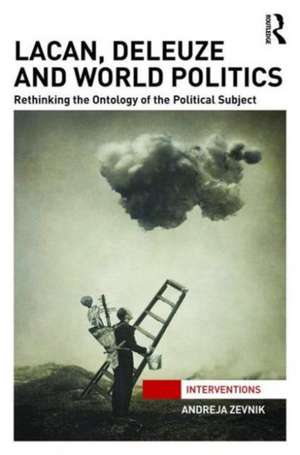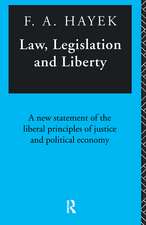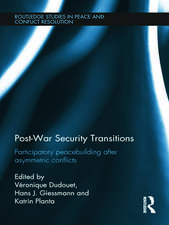Lacan, Deleuze and World Politics: Rethinking the Ontology of the Political Subject: Interventions
Autor Andreja Zevniken Limba Engleză Hardback – 7 mar 2016
This investigation into political appearance of subjects through concepts of law, body and life is led and influenced by the thought of Gilles Deleuze and Jacques Lacan, as well as Alain Badiou, Antonio Negri and Slavoj Žižek. The book takes on various conceptualisations of life, explores the relationship between law and life and develops an alternative notion of legal and political existence in particular in the context of rights. On the back of Guantánamo’s legal and political discourses this work aims to show why and how the problems of world politics or the limitations of (human) rights discourse require an engagement with questions such as what it means to exist as a human being, what forms of life are politically recognised, which are not, and why this distinction.
By pointing to a different ontology for thinking and understanding global politics and demonstrating how a trans-disciplinary and philosophical approaches can foster the debates in world politics, this book will be of interest to postgraduates and scholars working on critical normative ideas in international politics, critical security studies and critical legal studies.
| Toate formatele și edițiile | Preț | Express |
|---|---|---|
| Paperback (1) | 312.34 lei 6-8 săpt. | |
| Taylor & Francis – 26 oct 2017 | 312.34 lei 6-8 săpt. | |
| Hardback (1) | 846.92 lei 6-8 săpt. | |
| Taylor & Francis – 7 mar 2016 | 846.92 lei 6-8 săpt. |
Din seria Interventions
-
 Preț: 297.79 lei
Preț: 297.79 lei -
 Preț: 310.65 lei
Preț: 310.65 lei -
 Preț: 309.41 lei
Preț: 309.41 lei -
 Preț: 319.01 lei
Preț: 319.01 lei -
 Preț: 327.40 lei
Preț: 327.40 lei -
 Preț: 156.44 lei
Preț: 156.44 lei -
 Preț: 128.80 lei
Preț: 128.80 lei - 9%
 Preț: 1041.01 lei
Preț: 1041.01 lei -
 Preț: 112.30 lei
Preț: 112.30 lei -
 Preț: 123.84 lei
Preț: 123.84 lei -
 Preț: 302.17 lei
Preț: 302.17 lei -
 Preț: 286.66 lei
Preț: 286.66 lei -
 Preț: 309.65 lei
Preț: 309.65 lei -
 Preț: 111.26 lei
Preț: 111.26 lei -
 Preț: 312.36 lei
Preț: 312.36 lei -
 Preț: 309.70 lei
Preț: 309.70 lei -
 Preț: 311.48 lei
Preț: 311.48 lei -
 Preț: 379.30 lei
Preț: 379.30 lei -
 Preț: 279.25 lei
Preț: 279.25 lei -
 Preț: 189.29 lei
Preț: 189.29 lei -
 Preț: 303.01 lei
Preț: 303.01 lei -
 Preț: 342.07 lei
Preț: 342.07 lei -
 Preț: 443.86 lei
Preț: 443.86 lei - 18%
 Preț: 1055.06 lei
Preț: 1055.06 lei - 18%
 Preț: 999.51 lei
Preț: 999.51 lei - 25%
 Preț: 880.72 lei
Preț: 880.72 lei - 18%
 Preț: 1057.05 lei
Preț: 1057.05 lei - 18%
 Preț: 1001.90 lei
Preț: 1001.90 lei -
 Preț: 411.42 lei
Preț: 411.42 lei - 18%
 Preț: 1005.04 lei
Preț: 1005.04 lei - 18%
 Preț: 703.61 lei
Preț: 703.61 lei - 18%
 Preț: 1108.73 lei
Preț: 1108.73 lei - 18%
 Preț: 699.96 lei
Preț: 699.96 lei - 18%
 Preț: 1005.04 lei
Preț: 1005.04 lei -
 Preț: 409.69 lei
Preț: 409.69 lei - 18%
 Preț: 1055.32 lei
Preț: 1055.32 lei - 18%
 Preț: 1109.99 lei
Preț: 1109.99 lei - 18%
 Preț: 1056.00 lei
Preț: 1056.00 lei -
 Preț: 393.86 lei
Preț: 393.86 lei - 18%
 Preț: 1113.95 lei
Preț: 1113.95 lei - 18%
 Preț: 1111.72 lei
Preț: 1111.72 lei - 18%
 Preț: 1053.79 lei
Preț: 1053.79 lei -
 Preț: 393.93 lei
Preț: 393.93 lei - 18%
 Preț: 1059.48 lei
Preț: 1059.48 lei - 26%
 Preț: 822.36 lei
Preț: 822.36 lei -
 Preț: 416.26 lei
Preț: 416.26 lei - 18%
 Preț: 1282.19 lei
Preț: 1282.19 lei
Preț: 846.92 lei
Preț vechi: 1215.35 lei
-30% Nou
Puncte Express: 1270
Preț estimativ în valută:
162.06€ • 173.30$ • 135.12£
162.06€ • 173.30$ • 135.12£
Carte tipărită la comandă
Livrare economică 17 aprilie-01 mai
Preluare comenzi: 021 569.72.76
Specificații
ISBN-13: 9781138192713
ISBN-10: 1138192716
Pagini: 244
Ilustrații: 4
Dimensiuni: 156 x 234 x 20 mm
Greutate: 0.41 kg
Ediția:1
Editura: Taylor & Francis
Colecția Routledge
Seria Interventions
Locul publicării:Oxford, United Kingdom
ISBN-10: 1138192716
Pagini: 244
Ilustrații: 4
Dimensiuni: 156 x 234 x 20 mm
Greutate: 0.41 kg
Ediția:1
Editura: Taylor & Francis
Colecția Routledge
Seria Interventions
Locul publicării:Oxford, United Kingdom
Public țintă
Postgraduate and UndergraduateCuprins
Introduction. Monist Ontology: minimalism, nothingness and the void. Being in the World: the limits of the political subject. Being and Existence in the Fields of Politics and Law. The Book. Chapter I: Law and Life: A Creation of a Political and Legal Subject. The Psychoanalytical Origins of Modern Legal Authority. The Legal Subject and the Institution of Law. A Different Legal Ordering: Sinthome and desire. Conclusion. Chapter II: Ontology of Life and the Limit of Thought. The Thought of the Outside: Life as a Force. The Immanence of Life. From Immanent Life to Appearance in the World. Conclusion. Chapter III: Appearance in the World I: Guantanamo and logics of bodily-becoming. Becoming as minor/molecular appearing in the world. Becoming- and the politics of appearance in Guantanamo. What a Body Can Do? Body Politics: Life, Death and the Limit of the Body. Chapter IV: Appearance in the World II: Guantanamo and Expressions of the Self. Desiring the World. Torture and the Perverse Workings of Desire. Writing the World. From Language to Lalangue, from Litter to Literature and from Poems to Freedom. Naming the World Otherwise. Conclusion. Chapter V: Images of Law in Guantanamo: From a Legal Case to a New Idea of Law. Understanding Guantánamo: an exposition of Guantánamo’s legal discourse. Taking Guantánamo Piece by Piece. Law as Life or Life as Law. Conclusion. Chapter VI: An Image of the New Ontology for World Politics and the Political Subject. Law and Being Without the Name-of-the-Father. Legal Recognition or What is the New Legal Existence. Conclusion. Conclusion: Subject, Ontology and World Politics. Love as an Image of an Ethical Community. ‘Not-All’ as a New Political Ontology. Appearance, Ontology and the World of….
Notă biografică
Andreja Zevnik is a Lecturer in International Politics at the University of Manchester, UK. Her research interests include theories of subjectivity, political violence and resistance, aesthetic politics, law and psychoanalysis. She is a co-editor of Jacques Lacan between psychoanalysis and politics (Routledge, 2015) and a convener of Critical Global Politics research cluster at Manchester.
Recenzii
'Zevnik's book addresses the profound question of how a non-exclusive political may be produced. Her impressive argument draws on the work of Lacan and Deleuze, as well as examples of micro-political practices in Guantanomo, to construct an innovative and provocative answer.' - Professor Kimberly Hutchings, Queen Mary University of London, UK
'The critique of the modern political subject is widely regarded and practiced as a core element of International Relations theory. Yet as these practices gradually settle into mainstream theory, they become less the answer to the questions they originally sought to address, and more part of the problem. Andreja Zevnik’s re-thinking of the political subject as a question of political existence knocks critique out of its comfort zone. By reconstructing the discourse of law in Deleuze and in the later texts of Lacan, she opens up a fundamental set of questions about the ontological foundations of reality and about the theoretical consequences these foundations have for our understanding of subjectivity, demonstrating its timeliness through a deep-going and sustained analysis of the political subject at Guantánamo. The book is made up of a subtle and yet robust set of readings that successfully navigate IR theory’s deeply ingrained assumptions about the foundation and continuity of the Cartesian subject. It is risky enterprise, carried out by the author with an uncommonly steady hand.' - J. Peter Burgess, Free University Brussels (VUB), Belgium
'Zevnik's book addresses the profound question of how a non-exclusive political may be produced. Her impressive argument draws on the work of Lacan and Deleuze, as well as examples of micro-political practices in Guantanomo, to construct an innovative and provocative answer.' - Professor Kimberly Hutchings, Queen Mary University of London, UK
'The critique of the modern political subject is widely regarded and practiced as a core element of International Relations theory. Yet as these practices gradually settle into mainstream theory, they become less the answer to the questions they originally sought to address, and more part of the problem. Andreja Zevnik’s re-thinking of the political subject as a question of political existence knocks critique out of its comfort zone. By reconstructing the discourse of law in Deleuze and in the later texts of Lacan, she opens up a fundamental set of questions about the ontological foundations of reality and about the theoretical consequences these foundations have for our understanding of subjectivity, demonstrating its timeliness through a deep-going and sustained analysis of the political subject at Guantánamo. The book is made up of a subtle and yet robust set of readings that successfully navigate IR theory’s deeply ingrained assumptions about the foundation and continuity of the Cartesian subject. It is risky enterprise, carried out by the author with an uncommonly steady hand.' - J. Peter Burgess, Free University Brussels (VUB), Belgium
'This is a powerful theoretical treatise and compelling application by an author who is peerless among IR scholars in her analyses of ontology's, subjectivity's, and desire's relationships with global politics.' - Michael J. Shapiro, University of Hawai'i, Manoa
'The critique of the modern political subject is widely regarded and practiced as a core element of International Relations theory. Yet as these practices gradually settle into mainstream theory, they become less the answer to the questions they originally sought to address, and more part of the problem. Andreja Zevnik’s re-thinking of the political subject as a question of political existence knocks critique out of its comfort zone. By reconstructing the discourse of law in Deleuze and in the later texts of Lacan, she opens up a fundamental set of questions about the ontological foundations of reality and about the theoretical consequences these foundations have for our understanding of subjectivity, demonstrating its timeliness through a deep-going and sustained analysis of the political subject at Guantánamo. The book is made up of a subtle and yet robust set of readings that successfully navigate IR theory’s deeply ingrained assumptions about the foundation and continuity of the Cartesian subject. It is risky enterprise, carried out by the author with an uncommonly steady hand.' - J. Peter Burgess, Free University Brussels (VUB), Belgium
'Zevnik's book addresses the profound question of how a non-exclusive political may be produced. Her impressive argument draws on the work of Lacan and Deleuze, as well as examples of micro-political practices in Guantanomo, to construct an innovative and provocative answer.' - Professor Kimberly Hutchings, Queen Mary University of London, UK
'The critique of the modern political subject is widely regarded and practiced as a core element of International Relations theory. Yet as these practices gradually settle into mainstream theory, they become less the answer to the questions they originally sought to address, and more part of the problem. Andreja Zevnik’s re-thinking of the political subject as a question of political existence knocks critique out of its comfort zone. By reconstructing the discourse of law in Deleuze and in the later texts of Lacan, she opens up a fundamental set of questions about the ontological foundations of reality and about the theoretical consequences these foundations have for our understanding of subjectivity, demonstrating its timeliness through a deep-going and sustained analysis of the political subject at Guantánamo. The book is made up of a subtle and yet robust set of readings that successfully navigate IR theory’s deeply ingrained assumptions about the foundation and continuity of the Cartesian subject. It is risky enterprise, carried out by the author with an uncommonly steady hand.' - J. Peter Burgess, Free University Brussels (VUB), Belgium
'This is a powerful theoretical treatise and compelling application by an author who is peerless among IR scholars in her analyses of ontology's, subjectivity's, and desire's relationships with global politics.' - Michael J. Shapiro, University of Hawai'i, Manoa
Descriere
This book re-thinks the way in which the subject is inscribed in the modern political by exploring the potentiality of a monist ontology in a Lacano-Deleuzian theoretical framework. It concerns a different ontology and a non-dualist understanding of political and legal being, focusing on the questions: how to think alternative notions of existence and what their political, social and legal implications are? This book will be of interest to postgraduates and scholars working on critical normative ideas in international politics, critical security studies and critical legal studies.










